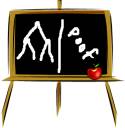Teach 'Both' Sides
 While reading a story in the Houston Chronicle on the recent naming of three ID proponents to the six member Texas Science Standards Review Panel, I read the following quote, "Close-minded efforts to ban students from (hearing both sides) is dangerous and a clear detriment to students."
While reading a story in the Houston Chronicle on the recent naming of three ID proponents to the six member Texas Science Standards Review Panel, I read the following quote, "Close-minded efforts to ban students from (hearing both sides) is dangerous and a clear detriment to students."
It used to be that when I heard this argument about teaching 'both' sides regarding evolution, I'd sarcastically wonder to myself if that meant the right side and the wrong side. However, once I got to thinking about it a little more, I realized how biased the statement actually was. Using the word 'both' implies two sides, but what are these two sides? On the one hand, there's obviously the side of evolution, the pro-science side, backed by overwhelming evidence and endorsed by the scientific community. But what, exactly, is the other side? That Tepeu and Gucamatz created all plants and animals through their thoughts; that Pangu created the earth after emerging from a cosmic egg, and after dying his body became the sun, moon, stars, creatures, and plants; that Ra, alone and lonely, masturbated to create two more gods, and those gods went on to have children gods, who eventually created everything, including the plants and animals; that Yahweh created plants and animals a couple days after he created the Earth, or that some unspecified intelligence has been tinkering with life throughout the ages?
The problem is, there are many more than two sides concerning what the various peoples of the world believe and have believed concerning how life got here. Now, if any of those stories were actually true, that would be one thing. After all, science is about following the evidence wherever it leads. It just so happens that all of the evidence supports evolution. Unless you're a proponent of Last Thursdayism, there's really no question that evolution has occured.
When someone says to teach 'both' sides, what they usually mean is evolution, and their particular interpretation of the Bible. They're not interested in actual fairness. They want to see their religious view elevated above all other religious views to be taught in school.





 Oh boy, it looks like we're in for an ugly mess down here in Texas. For a bit of background - the current chairman of the Texas State Board of Education, Don McLeroy, is a creationist, who has openly advocated the teaching of Intelligent Design in schools (
Oh boy, it looks like we're in for an ugly mess down here in Texas. For a bit of background - the current chairman of the Texas State Board of Education, Don McLeroy, is a creationist, who has openly advocated the teaching of Intelligent Design in schools ( Douglas Adams once wrote, "Anything that is in the world when you're born is normal and ordinary and is just a natural part of the way the world works. Anything that's invented between when you're fifteen and thirty-five is new and exciting and revolutionary and you can probably get a career in it. Anything invented after you're thirty-five is against the natural order of things."
Douglas Adams once wrote, "Anything that is in the world when you're born is normal and ordinary and is just a natural part of the way the world works. Anything that's invented between when you're fifteen and thirty-five is new and exciting and revolutionary and you can probably get a career in it. Anything invented after you're thirty-five is against the natural order of things." Here is the second part of my review of the books I read in the last year.
Here is the second part of my review of the books I read in the last year.
 From the Ground Up
From the Ground Up It's the start of a new month, so I went through the server logs to see what the most popular pages were on this site for the month of September. There was a little shuffling around, but for the most part, the popular pages have stayed popular. One surprise was the blog entry,
It's the start of a new month, so I went through the server logs to see what the most popular pages were on this site for the month of September. There was a little shuffling around, but for the most part, the popular pages have stayed popular. One surprise was the blog entry,